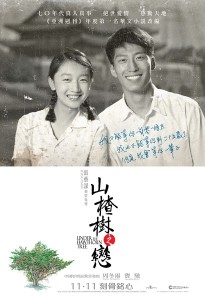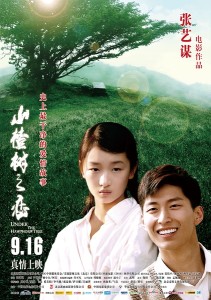Under the Hawthorn Tree
山楂树之恋
China/Hong Kong, 2010, colour, 2.35:1, 114 mins.
Director: Zhang Yimou 张艺谋.
Rating: 8/10.
Sensitively played love story set during the Cultural Revolution is a striking change of pace for director Zhang Yimou.
Yichang municipality, Hubei province, China, early 1970s. During the Cultural Revolution, high-school student Zhang Jingqiu (Zhou Dongyu) is one of many urban “educated youth” sent to be “re-educated” through work in the countryside under a dictat from Chairman Mao. She arrives with a group in Xiping village, in the Yangtze River’s Three Gorges region, where they are shown a hawthorn tree called the Tree of Heroes which was reputedly nourished by the blood of Chinese martyrs executed by the Japanese during WW2. Zhang Jingqiu is lodged with the family of village head Zhang (Li Xuejian), where she meets geology student Sun Jianxin (Dou Xiao) who also takes his meals at Zhang’s home. Sun Jianxin’s  father (Sun Haiying) is a high-up in the military but his mother committed suicide four years ago after being branded a “rightist”; Zhang Jingqiu’s father is a political prisoner somewhere in China and her mother (Xi Meijuan), a former teacher branded as a “capitalist”, is now reduced to menial work to support Zhang Jingqiu and her younger brother and sister. Despite the fact that one mistake could further imperil the future of her and her family, Zhang Jingqiu falls in love with Sun Jianxin, and their relationship continues after she graduates the following year. But she then hears a rumour that he has leukaemia.
father (Sun Haiying) is a high-up in the military but his mother committed suicide four years ago after being branded a “rightist”; Zhang Jingqiu’s father is a political prisoner somewhere in China and her mother (Xi Meijuan), a former teacher branded as a “capitalist”, is now reduced to menial work to support Zhang Jingqiu and her younger brother and sister. Despite the fact that one mistake could further imperil the future of her and her family, Zhang Jingqiu falls in love with Sun Jianxin, and their relationship continues after she graduates the following year. But she then hears a rumour that he has leukaemia.
REVIEW
It’s easy to forget, among all the colourful spectacles like Hero 英雄 (2002) or Curse of the Golden Flower 满城尽带黄金甲 (2006), or Olympic ceremonies, operas and son-et-lumières that Zhang Yimou 张艺谋 has directed during the past decade, that he remains a highly versatile filmmaker at heart. Under the Hawthorn Tree 山楂树之恋 is an abrupt reminder of the Zhang who also made the touchingly “simple” Riding Alone for Thousands of Miles 千里走单骑 (2005), Happy Times 幸福时光 (2000) and The Road Home 我的父亲母亲 (1999), all love stories in their different ways. Hawthorn is one of a very small number of mainland Chinese melodramas (including the remarkable 1992 Heartstrings 心香, by Sun Zhou 孙周) that’s pitched at an almost purely metaphysical level – a film about the feeling of being in love for the first time, rather than just the physical sensation or story mechanics.
Hawthorn is closest in spirit to The Road Home – which launched the career of actress Zhang Ziyi 章子怡 at the age of 20 – though visually it’s a much more ascetic movie. (It seems amazing that Hawthorn‘s coolly precise images are from the same d.p., Zhao Xiaoding 赵小丁, who recently shot the much flashier Welcome to Shamatown 决战刹马镇 (2010), True Legend 苏乞儿(2009) and Little Big Soldier 大兵小将 (2010), as well as Zhang Yimou’s more operatic movies.) Whether Hawthorn will do the same for 18-year-old ballet student Zhou Dongyu 周冬雨 as Road did for Zhang Ziyi remains to be seen, but it’s fair to say that she’s a considerable find, with a killer smile, a capacity for genuine pathos, and a much less knowing face than the younger Zhang Ziyi. She also pulls off the hardest trick nowadays, convincing a modern-day audience of absolute sexual naivety.
Zhou’s high-school student Zhang Jingqiu is some way from the character in the original source material, an online novel by Ai Mi 艾米 published in 2007 and known in English as Hawthorn Tree Forever). In the book she’s a more buxom 16-year-old, with a self-centred, self-pitying side; in the movie she’s slim and cute but also sincere and strong-willed, launching herself into a potentially tragic love story after what is virtually love at first sight. It’s to Zhou’s credit that she balances all these characteristics into a fully rounded character without ever seeming to wink at the audience. Readers of the book (which is now being translated into several languages) may be somewhat disappointed by this re-imagining of Zhang Jingqiu, but in the movie’s own universe she makes absolute sense, helped by Zhang Yimou’s restrained direction and good chemistry between Zhou and Canada-raised Dou Xiao 窦骁 [Shawn Dou] as the object of her affection. A newcomer like Zhou, the 21-year-old Dou makes a handsome, kindly love object but doesn’t bring any special qualities to the part of the boyfriend that haven’t been seen in other first-love dramas.
Based on the unpublished diaries of a real woman who later emigrated to the US, the novel was mooted as a project for several directors, and almost ended up being directed by Yin Lichuan 尹丽川 (The Park 公园, 2007; Knitting 牛郎织女, 2008), who conflated three scripts by separate writers, including Gu Xiaobai 顾小白 (The Red Awn 红色康拜因, 2007). In the end, the project passed from her to Zhang Yimou, whose deliberately “pure” approach to the love story – pushing Cultural Revolution politics to the back (or entirely off) of the screen – gives the movie an almost abstract, self-contained feel, heightened by the vagueness of its setting (somewhere near the Three Gorges in central China in the early 1970s). Close-up inserts of hands almost touching – or the way in which a small event like Zhang Jingqiu spending a night with Sun Jianxin in hospital is developed into a full sequence – increase the sense of emotional intimacy that pervades the movie. It also helps the basically thin storyline to sustain itself across almost two hours.
On other technical levels, from the restrained use of the rising and falling love theme by composer Chen Qigang 陈其钢 to the believable 1970s art direction by Wu Ming 武明, the film is immaculately appointed. Where it falls short is in not quite delivering the emotional release some audiences will expect at the end: unlike in The Road Home, Zhang Yimou keeps the brakes on a little too long, and the flow of the film isn’t helped by regular intertitles patching in developments.
CREDITS
Presented by Beijing New Picture Film (CN), IDG China Creative Media (CN), New Classical Entertainment (CN), Film Partner (2010) International (HK). Produced by Beijing New Picture (CN), IDG China Creative Media (CN), New Classical Entertainment (CN), Film Partner (2010) International (HK).
Script: Yin Lichuan, Gu Xiaobai, A Mei. Shooting script: Xiao Kefan. Literary advice: Zhou Xiaofeng. Online novel: Ai Mi. Photography: Zhao Xiaoding. Editing: Meng Peicong. Music: Chen Qigang. End song: Ryabina Kudryavaya. Art direction: Wu Ming. Costumes: Ma Defan. Sound: Tao Jing, Steve Burgess.
Cast: Zhou Dongyu (Zhang Jingqiu), Dou Xiao [Shawn Dou] (Sun Jianxin), Xi Meijuan (Zhang Jingqiu’s mother), Li Xuejian (Zhang, village head), Cheng Taishen (Luo), Sarina (auntie), Lv Liping (Weihong’s mother), Jiang Ruijia (Weihong, Zhang Jingqiu’s friend), Yu Xinbo (Zhang Changlin), Yi Xinyun (Zhang Changfang), Sun Haiying (Sun Jianxin’s father), Qi Ke (Li, director), He Xiaoyu (Huanhuan), Wang Zheng (eldest brother), Yao Zhuoran (sister-in-law), Qiu Muyuan (Zhang Jingqiu’s younger brother), Hu Xinyuan (Zhang Jingqiu’s younger sister), Yao Li (Gao, nurse).
Release: China, 16 Sep 2010; Hong Kong, 11 Nov 2010.
(Review originally published on Film Business Asia, 27 Sep 2010.)
